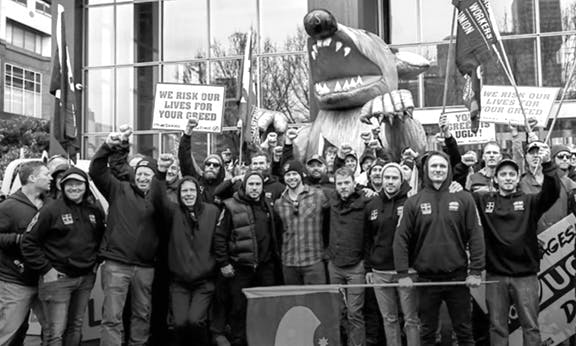Longford gas dispute: ‘a fight worth fighting’

There’s not much being held back in the jeers hurled from the picket to those crossing the line to work. At the union protest outside the Longford gas plant in Gippsland, accusations that scabs “betray the spirit of Eureka” are directed towards those in sight of the picket line among a cacophony of recorded monkey noises and other cries from the crowd.
A sombre call, “Remember 1998!” rings from one megaphone, referencing the catastrophic explosion at the plant that killed two workers. Everyone on the picket has heard the reports that a few weeks ago, one of the strikebreakers made a mistake that brought the plant close to another disaster of the same scale.
After almost 150 days picketing, the energy and dedication of these sacked maintenance workers remains solid, seemingly unshakable. It’s clear that their resolve is buoyed by their understanding of the significance of this dispute.
“We want to stop other companies using the same tactics to undermine their workers, because if we allow this to keep on happening, soon there’ll be nothing left”, explains Troy, a maintenance worker on the Bass Strait oil rig and an Australian Manufacturing Workers’ Union delegate.
Troy, like the others, was employed by UGL, which has the maintenance contract for the jointly owned Exxon Mobile-BHP oil rig and gas processing plant. The dispute started almost five months ago when UGL sacked Troy and around 200 other skilled maintenance workers. It offered them their jobs back if they agreed to work under an inferior enterprise agreement.
It’s an aggressive tactic intended to break the back of a well-unionised workforce and wreck the wages and conditions fought for and won over decades of struggle. The company has successfully employed the same strategy at a number of sites UGL is contracted to maintain, including at Altona in Melbourne and Darwin.
The agreement UGL is trying to force its workers onto would cut wages by 30 percent and introduce an open-ended roster that would allow the company to roster them for two, three or more weeks straight before they can access one week off. Even then the company wants the power to cancel that one week if it deems it necessary.
A roster like this has been blamed for a raft of suicides at the Inpex LNG plant currently under construction in Western Australia. Refusing to be blackmailed into signing away their wages and conditions, the workers rejected taking their jobs back on the company’s terms. Instead, with the support of their unions, the AMWU, ETU and AWU, they immediately set up a protest site outside the plant.
I was at Longford on day 148 of the picket, and the mood was resolute. Only a minority of the sacked workers have gone back to work; most are holding out. The entrance to the picket is adorned with Eureka flags and the painted shipping container from the CUB picket last year, a reminder of the nearly identical 185-day dispute that ended with a victory at the brewery in Abbottsford.
Referencing the CUB dispute is a reminder, not just that victory is possible, but also that this is not an isolated battle. These workers can see that bosses everywhere are exploiting industrial laws to push down wages and conditions. They are conscious that the push back will be led by the best organised sites, like their own. “If we continue to fight this, with the support we’re getting, we’ll fight until we win”, Troy says confidently.
As lunch rolls around, a crowd of construction workers in orange coveralls stream into the picket and share sausages from the barbecue with us. They’re building a new section of the plant nearby. Every day they share lunch with the picketers. They also each make a generous weekly donation to the strike fund, which Troy says “keeps them going”. Speaking about the importance of a win, one of the construction workers says, “This is just the start of it; if it happens here, then we’ll see it at the next EBA and the next and the next”.
This image of dominoes falling seems to fit what’s happening here. Management has picked off section by section of the workforce and tried to isolate the Longford workers. This is why the solidarity of other workers and the support of the community are key to maintaining the determination of the picketers. “Sometimes you’ve got to take a stand and fight for a cause”, says the construction worker, “this is a fight worth fighting”.